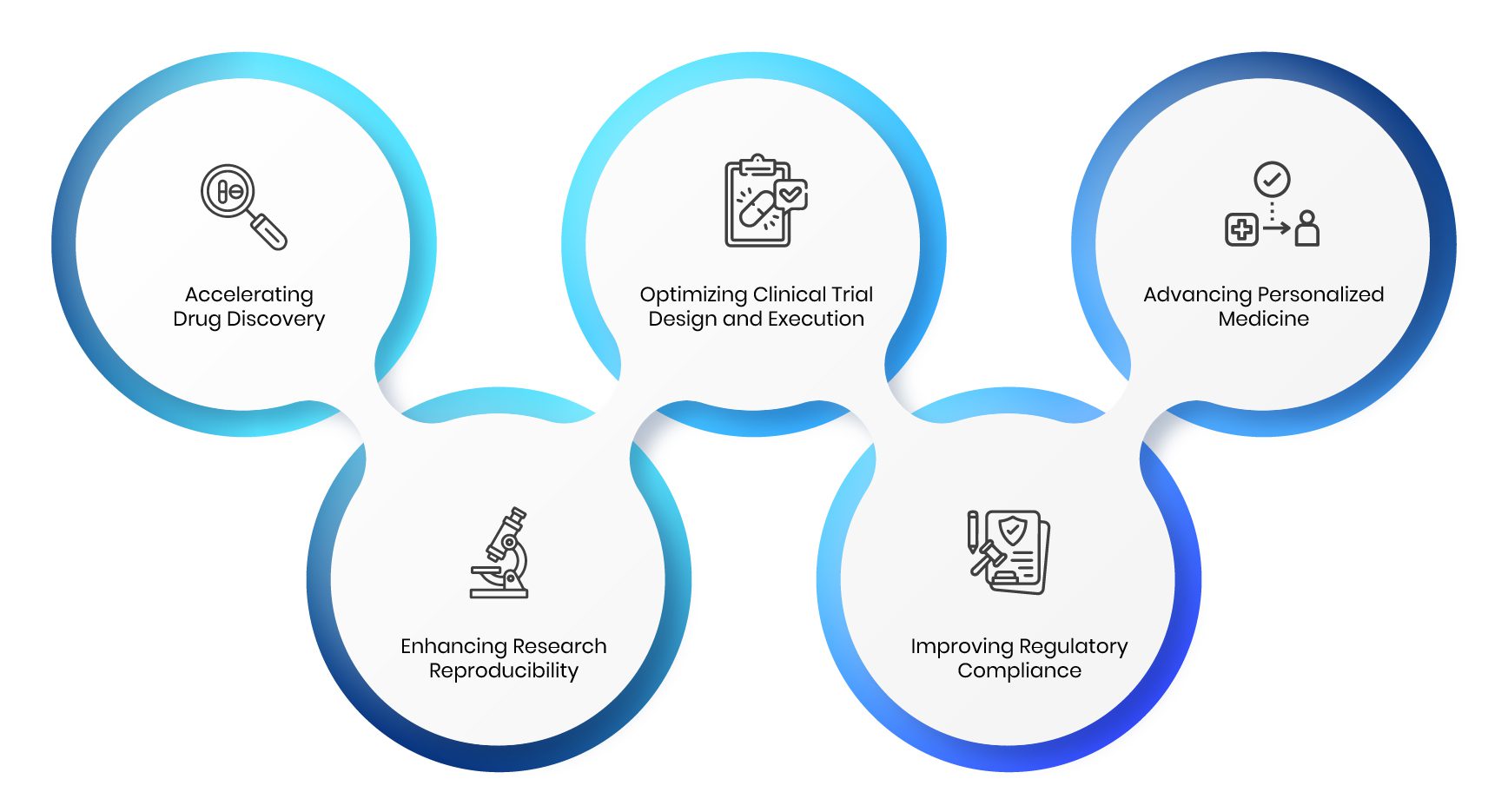- Drug development is fraught with challenges, as evidenced by the high rate of candidate failures during clinical trials due to inadequate evidence or ambiguous data. However, the landscape is shifting with the rise of collaborative data initiatives.
- These initiatives embody a collective effort among stakeholders, enhancing research reliability through transparency, optimizing clinical trial procedures, and laying the groundwork for personalized medicine by integrating diverse data sources.
- Yet, amidst the remarkable progress fostered by collaborative data initiatives, ensuring the security and privacy of shared data remains paramount. As data exchange becomes more widespread, robust measures are imperative to safeguard sensitive information and uphold patient confidentiality.
- Unified Data Management (UDM) software emerges as a crucial facilitator of secure and efficient collaboration within the pharmaceutical industry. By centralizing data management, UDM software streamlines processes, enhances transparency, and ensures compliance with regulatory standards.
Pouring resources and years into drug development only to see it crumble due to insufficient evidence or murky data is a harsh reality for nearly 80% of drug hopefuls in clinical trials. It’s a tough pill to swallow, highlighting the dire need for a significant shift in our approach. But here’s the silver lining: that shift is already happening, thanks to collaborative data initiatives.
These initiatives represent a united front against the fragmented and opaque reality that often plagues drug development. They create an environment where data flows freely, best practices reign supreme, and transparency becomes the norm. And the benefits aren’t just theoretical. Studies have shown that collaborative data sharing can slash development timelines in half and reduce costs by 60%. That’s not just impressive; it could be life-changing.
In this blog, we’re diving deep into the heart of this transformative movement. Here, we’ll delve deep into the intricacies of collaborative data initiatives, uncovering how they empower pharmaceutical companies to navigate the ever-changing industry dynamics with confidence. Moreover, we’ll shed light on the crucial significance of ensuring the security and privacy of shared data, emphasizing the indispensable role of UDM in facilitating secure and efficient collaboration within the pharmaceutical industry. So, without further ado, let’s dive right in.
What are Collaborative Data Initiatives, and How is it Transforming Pharma?
In today’s rapidly evolving pharmaceutical landscape, Collaborative Data Initiatives are beacons of progress and promise. They represent a collective effort among stakeholders — including pharmaceutical companies, research institutions, healthcare providers, and regulatory bodies — to harness the power of data for the betterment of healthcare. At their core lies the fundamental aspect of centralization and synergy. By bringing together diverse expertise and resources, they enable us to tackle complex challenges in drug discovery, clinical research, and patient care with unprecedented unity and effectiveness.
Think about it: in a world where information is abundant but often siloed, Collaborative Data Initiatives break down barriers and unlock the full potential of data. They allow us to pool our collective knowledge, insights, and experiences, resulting in richer analyses, deeper understanding, and, ultimately, more impactful outcomes for patients. Take, for instance, the Observational Health Data Sciences and Informatics (OHDSI) program. Through this initiative, researchers, healthcare providers, and data scientists collaborate to analyze vast amounts of real-world healthcare data, generating invaluable insights into the safety and effectiveness of medical treatments, shaping clinical practices, and improving patient care worldwide.
However, beyond their transformative impact on data utilization, Collaborative Data Initiatives are fundamentally driven by human collaboration, uniting the brightest minds to advance healthcare and improve patient outcomes. Whether it’s uncovering new treatment pathways or optimizing healthcare delivery, these initiatives embody the spirit of teamwork and innovation that defines modern medicine.

- Accelerating Drug Discovery: Collaborative data initiatives serve as powerful accelerators in the race to discover new drugs by fostering an environment of seamless data sharing and collaboration among stakeholders. By dismantling traditional barriers and promoting open exchange, these initiatives empower researchers to tap into a vast pool of information spanning from initial preclinical studies to real-world patient data. This collaborative approach not only expedites the identification of promising drug targets but also deepens our understanding of disease mechanisms and potential therapeutic interventions, ultimately bringing life-saving treatments to patients faster than ever before. According to a study published in Nature Reviews Drug Discovery, collaborative data efforts can reduce drug development timelines by up to 30%.
- Enhancing Research Reproducibility: Scientific integrity hinges upon the reproducibility of research findings, and collaborative data initiatives are pivotal in fortifying this foundation. By championing transparency, rigor, and accountability in data collection, analysis, and reporting, these initiatives elevate the reliability and credibility of research outcomes. Through adherence to standardized protocols and best practices, researchers can ensure that their findings stand the test of time, instilling confidence in the validity and reproducibility of their work and driving meaningful progress in scientific discovery.
- Optimizing Clinical Trial Design and Execution: Clinical trials are the linchpin of drug development, and collaborative data initiatives play a crucial role in refining their design and execution. By facilitating the exchange of clinical data and insights, researchers can pinpoint patient populations more precisely, refine trial protocols more efficiently, and implement recruitment and retention strategies more effectively. This streamlined approach not only expedites the pace of clinical development but also enhances the quality and relevance of trial outcomes, ushering in new treatments with greater efficacy and safety profiles.
- Improving Regulatory Compliance: Navigating the regulatory landscape is a paramount concern for pharmaceutical companies, and collaborative data initiatives offer a pathway to smoother compliance. By championing data-sharing endeavors and implementing robust data management practices, companies can ensure that their submissions to regulatory agencies meet stringent standards and guidelines. This commitment to sound scientific evidence not only expedites the approval process but also minimizes the risk of regulatory setbacks, paving the way for innovative treatments to reach patients in need.
- Advancing Personalized Medicine: The era of personalized medicine holds immense promise for revolutionizing patient care, and collaborative data initiatives are at the forefront of this transformation. By harnessing the power of big data analytics and artificial intelligence, researchers can integrate genomic, clinical, and lifestyle data to tailor treatment decisions to individual patient characteristics. This holistic approach to healthcare enables the identification of biomarkers, the stratification of patient populations, and the development of targeted therapies, ushering in a new era of precision medicine where every patient receives personalized care tailored to their unique needs.
Amidst the remarkable strides facilitated by collaborative data initiatives, ensuring the security and privacy of shared data remains paramount. As data exchange becomes more prevalent, robust measures must be in place to safeguard sensitive information and uphold patient confidentiality. Let’s understand more.
Data Sharing in Collaborative Pharmaceutical Initiatives
Collaborative Pharmaceutical Initiatives are the backbone of innovation, driving the collective effort among various stakeholders to advance drug discovery, enhance patient care, and shape the future of healthcare. However, within the realm of promising synergy and breakthroughs, enterprises encounter numerous formidable challenges in ensuring secure data sharing.
Chief among these challenges is the exponential surge in data, propelled by rapid technological advancements and the integration of artificial intelligence (AI) into research and development processes. According to a report by IDC, the volume of data generated worldwide is projected to reach 175 zettabytes by 2025, with healthcare data accounting for a significant portion of this growth. Furthermore, the incorporation of AI algorithms and machine learning models amplifies both the volume and complexity of data, placing substantial strain on enterprise infrastructure and resources.
Data silos emerge as another significant hurdle, hindering seamless collaboration and knowledge exchange among stakeholders. A survey conducted by Forrester Consulting found that 74% of organizations struggle with data silos, leading to inefficiencies in data management and analysis. Breaking down these siloes necessitates a concerted effort to foster a culture of collaboration and transparency, empowering enterprises to leverage shared data to its fullest potential in pharmaceutical initiatives.
In addition to grappling with data growth and siloes, enterprises confront the challenges posed by unstructured data. Clinical notes, medical images, and genomic sequences, among other unstructured data types, lack predefined data models and organization, complicating management, analysis, and insights extraction. According to a study published in the Journal of Biomedical Informatics, unstructured data accounts for approximately 80% of all healthcare data, highlighting the need for advanced data management strategies to unlock its potential in collaborative research endeavors.
Furthermore, regulatory and compliance concerns loom large in the landscape of collaborative pharmaceutical initiatives. Stringent regulations such as HIPAA, GDPR, and 21 CFR Part 11 impose rigorous requirements on data privacy, security, and integrity, compelling enterprises to establish robust data governance frameworks and compliance measures. Navigating these complex regulatory landscapes demands meticulous adherence to industry standards, ensuring legal and reputational risks associated with data breaches and non-compliance are effectively managed.
Amidst these challenges, the adoption of Unified Data Management (UDM) emerges as a transformative solution. UDM streamlines data integration, ensures data security and compliance, and unlocks the full potential of collaborative data sharing in pharmaceutical initiatives. Enterprises can overcome the complexities of data management, drive innovation, and advance patient care, cementing their position at the forefront of transformative change in the pharmaceutical industry.
The Role of UDM in Facilitating Effective and Secure Data Sharing
In the fast-paced world of pharmaceutical collaboration, Unified Data Management (UDM) emerges as a game-changer, not just in terms of technological prowess, but in its ability to deliver a data literate culture accelerating healthcare innovation.
UDM stands for Unified Data Management – a comprehensive approach to managing and leveraging data assets within an organization. It integrates various aspects of data management, including data integration, governance, security, and analytics, into a unified platform or system, creating a centralized platform for data exchange, empowering researchers, clinicians, and industry leaders to transcend organizational barriers and store, organize, analyze and collaborate seamlessly, within IT guardrails. This fosters a culture of cross-disciplinary insights, where data owners can derive actionable insights from their data assets, allowing the convergence of diverse perspectives to fuel groundbreaking discoveries and redefine the boundaries of medical knowledge.
Furthermore, it acts as a catalyst for data democratization, empowering frontline healthcare providers with access to real-time, actionable insights. Through intuitive interfaces and advanced analytics capabilities, UDM equips clinicians with the tools they need to make informed decisions at the point of care, driving personalized treatment strategies and improving patient outcomes. It enhances clinical decision-making and empowers patients to actively participate in their own care journey, leading to more engaged and informed healthcare experiences.
Beyond driving innovation and democratizing data, the system plays a crucial role in safeguarding data privacy and security in an era marked by increasing cyber threats and regulatory scrutiny. By implementing state-of-the-art encryption technologies and robust access controls, UDM ensures the confidentiality and integrity of sensitive patient information, instilling confidence among stakeholders and fostering a culture of trust and transparency. This commitment to data security not only protects patient privacy but also strengthens the foundation of collaborative partnerships, enabling stakeholders to share insights with confidence and collaborate more effectively.
Moreover, the software unlocks the hidden potential of unstructured data, revolutionizing the way researchers extract insights from clinical notes, medical images, and genomic sequences. Through advanced natural language processing and machine learning algorithms, UDM enables researchers to uncover valuable patterns and correlations buried within vast datasets, accelerating the pace of discovery and revolutionizing personalized medicine, thus enhancing research productivity and opening new avenues for innovation and discovery.
Undoubtedly, Unified Data Management (UDM) stands as a cornerstone of progress in healthcare, transcending its technical functions to embody a visionary approach to collaborative innovation. As pharmaceutical companies embrace this tech and harness its unparalleled capabilities, they not only redefine the way we approach healthcare but also reshape the landscape of medicine, forging a future where patient outcomes are optimized and possibilities are limitless.
The Data Dynamics Advantage
Collaborative efforts in the pharma industry require robust solutions to manage vast amounts of unstructured data effectively—a challenge that Data Dynamics addresses with its Unified Unstructured Data Management software. This software offers a holistic approach to navigating the complexities of unstructured data, thereby fostering secure and efficient data-sharing practices among stakeholders.
At the core of Data Dynamics’ solution is its Unified Unstructured Data Management software, a comprehensive offering that seamlessly integrates various technologies, including automation, artificial intelligence (AI), machine learning (ML), and blockchain. Trusted by over 28 Fortune 100 organizations, this software is designed to adapt to the demands of collaborative data-sharing initiatives within the pharmaceutical industry, ensuring scalability and efficiency in managing and sharing data effectively.
One of the software’s pivotal modules is Content Analytics, which harnesses the power of Data Science Engine, AI/ML, and Natural Language Processing (NLP) for accurate discovery and classification of data. This capability enables organizations involved in collaborative data-sharing initiatives to understand the sensitivity, consumer information, and business value of their data. Risk Exposure Insights, another feature of Content Analytics, empowers organizations with actionable insights through descriptive and diagnostic analytics, offering a comprehensive understanding of potential risks. This level of visibility is essential for making informed decisions regarding data-sharing practices within collaborative efforts.
Data Dynamics prioritizes data security and compliance, recognizing the sensitive nature of data within the pharmaceutical industry. The software provides robust security measures, including risk remediation and access control, to ensure that high-risk sensitive data is quarantined in secure storage. This not only enhances data security but also facilitates compliance with stringent regulatory frameworks governing the pharmaceutical sector. The Open Share Reporting functionality further enhances security by identifying sensitive data within open shares and rectifying permissions accordingly, ensuring that data is shared securely among collaborators.
Ultimately, Data Dynamics envisions a future where collaborative data-sharing initiatives within the pharmaceutical industry achieve data democratization. This vision translates into stakeholders of varying technical backgrounds swiftly accessing, comprehending, and extracting maximum insights from sprawling unstructured data landscapes. It represents a shift from data being a siloed resource to a democratized asset accessible to all relevant stakeholders involved in collaborative efforts. In a landscape where the effective management of unstructured data is crucial for successful collaborative endeavors, Data Dynamics stands as a strategic partner for pharmaceutical companies, offering not just a solution but a transformative approach to data management that aligns with the evolving needs of collaborative data-sharing initiatives within the industry.
To explore how Data Dynamics can assist your collaborative data-sharing initiatives within the pharmaceutical industry, visit our offerings at www.datadynamicsinc.com or reach out to us at solutions@datdyn.com or (713) 491-4298.






